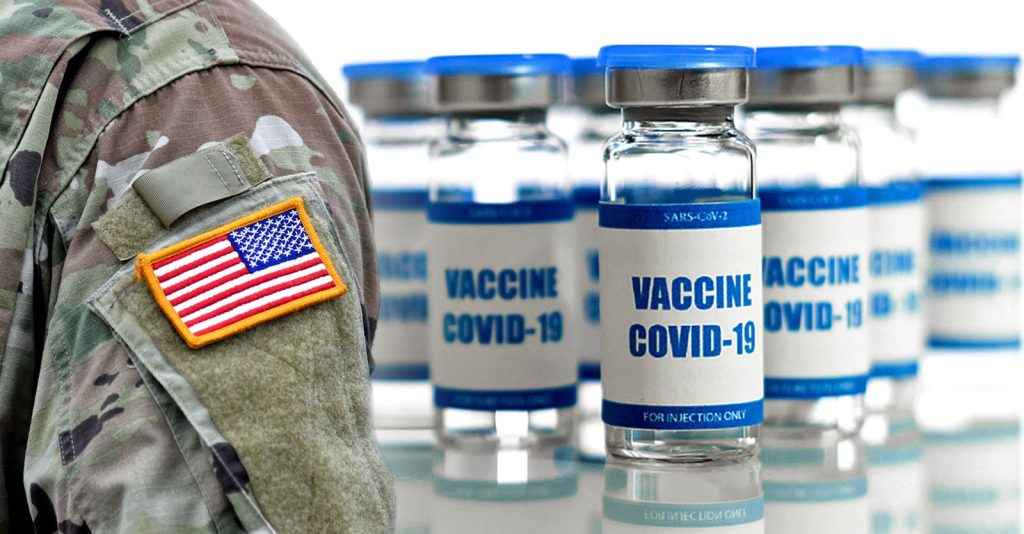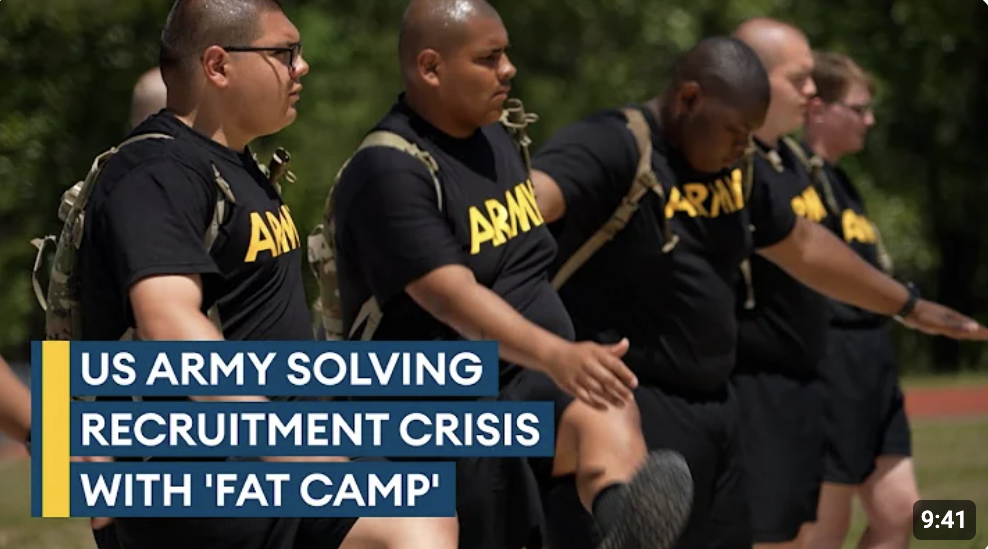The U.S. military could owe billions in back pay and legal fees depending on the outcome of three class-action lawsuits filed on behalf of service members who allege they were wrongfully discharged for refusing the COVID-19 vaccine.

Guest post By Michael Nevradakis, Ph.D.
The U.S. military could owe billions in back pay and legal fees depending on the outcome of three class-action lawsuits filed on behalf of service members who allege they were wrongfully discharged for refusing the COVID-19 vaccine.
Among the claims made by the plaintiffs are that the military could not legally mandate vaccines issued under Emergency Use Authorization (EUA), as was the case with the COVID-19 vaccines, and that it was nearly impossible for service members requesting a religious exemption to have those requests approved
Florida lawyer Dale Saran, who represents the plaintiffs, told Fox Business his legal team represents “basically everybody who got kicked out, discharged or dropped to the IRR [individual ready reserve] as a result of not taking the vaccine.”
This could include more than 100,000 former service members, according to the plaintiffs’ legal team, led by Saran and two other attorneys: Brandon Johnson and J. Andrew Meyer.
It’s unclear how many service members were involuntarily discharged for refusing the vaccine, but estimates range from more than 8,000 to just under 2,000.
Fox News last week reported, “thousands of troops unsuccessfully sought religious exemptions from the inoculation, including 8,945 soldiers, 10,800 airmen and guardians, 4,172 sailors, and 3,717 Marines.”
Regardless of the actual number, the U.S. Army is trying to get members who were involuntarily discharged to reenlist, according to an undated letter that surfaced last week.
The letter states:
“We write to notify you of new Army guidance regarding the correction of military records for former members of the Army following rescission of the COVID-19 vaccine requirement. As a result of the rescission of all current COVID-19 vaccine requirements, former Soldiers who were involuntarily separated for refusal to receive the COVID-19 vaccine may request a correction of their military records from either or both the Army Discharge Review Board (ADRB) or the Army Board for Correction of Military Records (ABCMR).”
Defense Secretary Lloyd Austin on Aug. 24, 2021, mandated members of the U.S. military get the COVID-19 vaccine.
However, in late 2022, Congress passed the 2023 National Defense Authorization Act, which required Austin to rescind the mandate, which he did on Jan. 10, 2023.
The three lawsuits — Bassen v. The United States of America, Botello v. The United States of America and Harkins v. The United States of America — were filed Aug. 4 in the U.S. Court of Federal Claims, “seeking back pay and other compensation, as well as reinstatement and other non-monetary relief, for all current or former members of the U.S. Armed Forces harmed by the illegal COVID-19 vaccine mandate.”
The U.S. government has filed motions to dismiss each of the three lawsuits.
Three separate lawsuits cover all military branches, National Guard, Coast Guard
According to the lawsuits, the U.S. government “has systematically violated service members’ religious liberties” via a “sham religious accommodation process,” and violated informed consent laws, the Military Pay Act, the Religious Freedom Restoration Act of 1993 and the National Defense Authorization Act (NDAA).
Saran told Fox Business there are three separate lawsuits, largely because of the way the U.S. Department of Defense (DOD) is set up.
According to the plaintiffs’ legal team, Bassen v. United States “is a class action filed on behalf of the approximately 8,500 active-duty service members who were involuntarily discharged … as well as any other active-duty service members who were forced into early retirement or were constructively discharged due to their vaccination status.”
This includes “all former service members (except Coast Guard) who were on Title 10 active-duty orders when discharged.”
Botello v. United States is a class action seeking back pay and “other remedies for 70,000-100,000 members of the Air and Army National Guard, and for reserve members of all services, who were dropped from active-duty orders or active status, denied pay or benefits or prohibited from participating in drills, training, and other duties.”
This includes “all service members (except Coast Guard) on Title 32 Orders in the National Guard or Reserve.”
In turn, Harkins v. United States is a “class action filed on behalf of the active-duty and reserve Coast Guard members who were involuntarily discharged due to their unvaccinated status, as well as any other Coast Guard members who were forced into early retirement or were constructively discharged due to their vaccination status.”
‘You start talking about $6 billion or more’
The lawsuits seek financial restitution, including back pay and legal fees for the named plaintiffs, the establishment of a common fund that would provide compensation for plaintiffs who later join any of the class action suits, reinstatement of the service members and correction of their records.
The lawsuits also allege the U.S. government committed “illegal exactions” by “indebting” some of the affected service members when it demanded that enlistment bonuses, post-9/11 G.I. Bill benefits, training and tuition costs and “other allowances or special pays, such as separation pay or travel allowances,” be returned.
According to the plaintiffs’ legal team, when Congress ordered the DOD to rescind the mandate, it did not explicitly order the military to provide back pay and financial compensation for all the service members and veterans harmed by the mandate.
The lawsuits note, however, that in the NDAA, Congress “expressly chose the term ‘rescind,’ rather than more customary language such as ‘repeal,’ ‘amend,’ or ‘clarify,’ to direct the DoD and the courts that ‘the rescission should be applied retroactively to render the Mandate null and void ab initio.’”
Saran told The Defender that “‘rescind’ is a legal term of art” which “means something distinct from ‘repeal.’”
“In our view, by rescinding, Congress intended that members should be treated as if the mandates were never issued — i.e., in legal parlance, that the orders to take the shots were void ab initio [from inception]. This means people should be put back into the position — as best the government is able — as they were before this happened,” he said.
Saran told Fox Business the total back pay owed to service members who qualify for any of the three lawsuits might total “billions.” Citing an armed forces personnel budget of approximately $158 billion and disciplinary actions that impacted approximately 4% of military service members, “you start talking about $6 billion or more.”
In addition to back pay, Saran told The Defender service members who faced disciplinary actions as a result of their unvaccinated status may be able to seek restoration of “some” back benefits, which “largely depends upon whether those benefits are classified as ‘direct’ damages (yes) or ‘consequential’ damages (no).”
Military had no legal authority to mandate EUA vaccines
The lawsuits claim the plaintiffs can claim back pay because the DOD “unlawfully mandated Emergency Use Authorization (‘EUA’) only products in violation of Congress’ explicit statutory prohibition in 10 U.S.C. §1107a.”
Compliance with the mandate “was impossible because the DoD did not have any products licensed by the Food and Drug Administration (‘FDA’) … while the Mandate was in effect,” the lawsuits state, referring to the Pfizer Comirnaty and Moderna Spikevax COVID-19 vaccines.
“The DoD has admitted in related litigation that the DoD did not have any FDA-licensed COVID-19 vaccines” when the mandate was issued in 2021, the lawsuits state. Instead, the DOD “began using and mandating the unlicensed, EUA Pfizer/BioNTech COVID-19 vaccine based on the DoD’s determination” that the two were “interchangeable.”
Notably, in November 2021, a federal judge rejected the DOD’s claim that the fully licensed Comirnaty and the EUA Pfizer-BioNTech vaccines were “interchangeable.”
“Austin’s mandate … claimed that service members would only be required to take fully licensed vaccines, but Pfizer-BioNTech BNT162b2 was neither licensed nor a vaccine by the DOD’s own regulations and the manufacturers’ own SEC filings,” Saran said.
“Comirnaty was removed from the market by the FDA the same day it was licensed, and then a DOD official with no legal authority, Terry Adirim, M.D., MPH, MBA, issued an edict claiming that the unlicensed EUA products could be substituted in place of the licensed ones,” he added.
“Service members were forced to take experimental products — and we now know unequivocally just how deadly they have been,” Saran said.
Religious accommodation a ‘sham process’
The lawsuit also called into question the process for religious accommodations set forth by the DOD for service members, calling it a “sham process” and citing other legal cases where it was described as “a ‘quixotic quest’ that amounts to little more than ‘theater.’”
This process resulted in “nearly uniform denials of service members’ requests for religious accommodations, using nearly identical form letters with only names, dates, and titles or duties changed.”
According to the lawsuits, the Armed Services denied at least 99% of religious accommodation requests that were adjudicated, but the “true number” likely approaches 100% because “the small number” of approved claims “appear to have been disguised administrated exemptions granted to service members on terminal leave in their final months of service.”
“A lot of people had religious qualms about taking these and the military had lots of injunctions against it. It just did not handle this well at all,” Saran told Fox Business.
“It wasn’t a religious ‘accommodation’ process. It was a religious ‘targeting’ process where people who filed an accommodation were immediately removed from leadership billets, forced to retire, had promotions suspended, etc.,” Saran told The Defender, adding that federal law requires the military to “conduct individualized determinations.”
“It is criminal, and people should be in jail for intentional violation of the civil rights of service members,” he said.
Former service members can still join one of the class action lawsuits
One of the notable characteristics of the three lawsuits is that they have been filed in the U.S. Court of Federal Claims, a special court with jurisdiction over claims seeking monetary claims against the federal government.
According to the plaintiffs’ legal team, the court also has the authority to hear their non-monetary claims, stating that “it may address violations of other statutes to the extent necessary to resolve the underlying contractual dispute.”
Saran described the U.S. Court of Federal Claims as a specialized court with nearly exclusive jurisdiction over military back pay claims and other specialized areas like vaccine injuries, government contract disputes, and patent and trademark claims.
Any former service member that falls into any of the categories covered by the lawsuits “may have a claim for back pay, financial compensation or other remedies such as reinstatement or correction of military records,” the legal team said.
Army invitation to unvaccinated service members to reenlist ‘disingenuous’
While the U.S. government is attempting to have the three lawsuits dismissed, it has nevertheless admitted that the armed forces are facing a recruitment crisis.
According to Fox News, “The Army expects to have ended fiscal year 2023 with nearly 55,000 recruiting contracts, including roughly 4,600 for the Army’s Delayed Entry Program — recruits who will ship in the 2024 fiscal year. As a result, the Army said it will meet its end-strength goal of 452,000 for active-duty soldiers.”
Yet, the same report states that on Oct. 3, “the U.S. Army announced a transformation of its recruiting enterprise, stressing how ‘the armed forces facing the most challenging recruiting environment in a generation.’”
According to Task & Purpose, the Army “missed its recruiting goals for this past year by nearly 15,000 soldiers.” It cites “A lack of interest from Gen Z to join the military” as well as factors “as broad as the economy and job market to … the service’s struggles with sexual assault and suicide in the ranks” as factors contributing to low recruitment.
Yet, according to the three lawsuits, Congress, in passing the NDAA 2023, identified the vaccine mandate as the “primary cause of the [DoD]’s recruiting difficulties,” disqualifying more than 40% “of the Army’s target demographic from service nationwide,” leading to “the loss of at least 75,000 from the Army alone.”
Saran told Fox Business that Austin “let go of some 70,000 to 100,000 National Guardsmen … almost 10% of the National Guard,” adding that the armed forces combined “sacked somewhere north of 85,000,” noting that “We don’t have exact numbers. The DOD hasn’t been entirely forthcoming.”
The plaintiffs’ legal team calls this “the greatest reduction in force since the end of the Cold War and likely the self-inflicted threat to national security and military readiness in our Nation’s history,” while the lawsuits call this a “self-imposed readiness crisis.”
“All of the services have missed their recruiting goals by a lot,” Saran said. He said factors that “almost assuredly” have led to this outcome include “the mRNA shot mandates” and “atrocious military and political leadership.”
“The manpower shortages are a fact. The DOD institutionally never admits it was wrong. Never. That’s a big part of their problem,” he said.
The Army’s recruitment crisis was apparent at least as early as June 2022, when a whistleblower revealed Army officials were concerned that the vaccine mandate could lead to combat ineffectiveness due to high numbers of unvaccinated members.
Michael Nevradakis, Ph.D., based in Athens, Greece, is a senior reporter for The Defender and part of the rotation of hosts for CHD.TV's "Good Morning CHD."
“© [Article Date] Children’s Health Defense, Inc. This work is reproduced and distributed with the permission of Children’s Health Defense, Inc. Want to learn more from Children’s Health Defense? Sign up for free news and updates from Robert F. Kennedy, Jr. and the Children’s Health Defense. Your donation will help to support us in our efforts.

























Who would want to launch a career into something as obviously messed up as the US military? Duty and honor are meaningless when you're screwed up in the head.
If the military services really want to get the people back they discharged wrongly for refusing the covid 19 shot they then should offer them time served from the time they were discharged, back pay to the day they re-enter. If they don't re-enlist then either give the people honorable discharges or expunge their records completely showing they never served in the military.